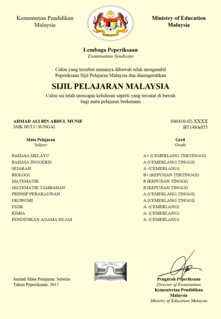Related Research Articles
In the education systems of England, Northern Ireland, Wales, Jamaica and some other Commonwealth countries, sixth form represents the final two years of secondary education, where students start the first academic year of the sixth form aged 16 and finish aged 17 at the end of that academic year then subsequently start the second academic year of the sixth form aged 17 and finish aged 18. During the two years the pupils typically prepare for A-level or sometimes equivalent examinations eg the IB or Pre-U. In England, Wales, and Northern Ireland, the term Key Stage 5 has the same meaning. It only refers to post-16 academic education and not to vocational education.
The General Certificate of Education (GCE) is a subject-specific family of academic qualifications that awarding bodies in England, Wales, Northern Ireland, Crown dependencies and a few Commonwealth countries. Ever since the 20th century, the Scottish education system is different from those in the other countries of the United Kingdom.

Matriculation is the formal process of entering a university, or of becoming eligible to enter by fulfilling certain academic requirements such as a matriculation examination.
The Secondary School Certificate, also called SSC or Matriculation examination, in madrasah education Dakhil is a public examination in India, Bangladesh and Pakistan conducted by educational boards for the successful completion of the secondary education exam in these countries. Students of 10th grade/class ten can appear in these. It is equivalent to GCSE in England and first two years of high schools in United States.
An examination board is small board organization that sets examinations, is responsible for marking them, and distributes results. Some are run by governmental entities; some are run as not-for-profit organizations.

The Sijil Pelajaran Malaysia (SPM), or the Malaysian Certificate of Education, is a national examination taken by all fifth-form secondary school students in Malaysia. It is the equivalent of the General Certificate of Secondary Education (GCSE) of England, Wales and Northern Ireland, the Nationals 4/5 of Scotland, and the GCE Ordinary Level of the Commonwealth of Nations. It is the leaving examination of the eleventh grade of schooling.
The Singapore-Cambridge General Certificate of Education Ordinary Level (O-level) examination is a national examination held annually in Singapore. The examinations are jointly conducted by the University of Cambridge Local Examinations Syndicate (UCLES), Singapore Ministry of Education (MOE) as well as the Singapore Examinations and Assessment Board (SEAB).

Education in Mauritius is managed by the Ministry of Education & Human Resources, which controls the development and administration of state schools funded by government, but also has an advisory and supervisory role in respect of private schools. The Tertiary education is maintained by the Ministry of Tertiary Education, Science, Research and Technology. The government of Mauritius provides free education to its citizens from pre-primary to tertiary levels. Since July 2005, the government also introduced free transport for all students. Schooling is compulsory up to the age of 16. Mauritian students consistently rank top in the world each year for the Cambridge International O Level, International A and AS level examinations. Among sub-Saharan African countries, Mauritius has one of the highest literacy rates. According to The World Factbook - Central Intelligence Agency as of 2018, 91.3% of the population age 15 and over can read and write in Mauritius were respectively literate.
The Higher Secondary Certificate (HSC) is a public examination credential in Bangladesh, India, and Pakistan. HSC is equivalent to GCE A Level in England and 3rd and 4th year of high schools in the United States.

The A Level is a subject-based qualification conferred as part of the General Certificate of Education, as well as a school leaving qualification offered by the educational bodies in the United Kingdom and the educational authorities of British Crown dependencies to students completing secondary or pre-university education. They were introduced in England and Wales in 1951 to replace the Higher School Certificate.

The O Level is a subject-based qualification conferred as part of the General Certificate of Education. It was introduced in place of the School Certificate in 1951 as part of an educational reform alongside the more in-depth and academically rigorous A-level in England, Wales and Northern Ireland. Those three jurisdictions replaced O Levels gradually with General Certificate of Secondary Education / GCSE and International General Certificate of Secondary Education (IGCSE) exams over time. The Scottish equivalent was the O-grade.
Examination boards in the United Kingdom are the examination boards responsible for setting and awarding secondary education level qualifications, such as GCSEs, Standard Grades, A Levels, Highers and vocational qualifications, to students in the United Kingdom.
The Certificate of Primary Education (CPE) was an academic qualification in Mauritius awarded upon the completion of primary school. The exam last took place at the end of 2016 before it was replaced by the Primary School Achievement Certificate (PSAC) in 2017. The qualification was awarded upon earning passing marks on the primary school exams administered by the Mauritius Examinations Syndicate. Students who fully earned the qualification then progressed into secondary school to continue studying.
The Form III Certificate was an academic qualification in Mauritius awarded upon successful completion of lower secondary school. The exam last took place at the end of 2019 and was replaced by the National Certificate of Education (NCE) in 2020. The qualification was awarded upon earning passing marks on the National Assessment at Form III exams, taken by Grade 9 at secondary school, which are administered by the Mauritius Examinations Syndicate.
The School Certificate is an academic qualification in Mauritius awarded upon the completion of Form 5, the penultimate stage of secondary school. The qualification is awarded upon earning passing marks on the O-level exams administered by the Mauritius Examinations Syndicate, in conjunction with the University of Cambridge Local Examinations Syndicate of the Cambridge International Examinations board.
The Higher School Certificate is an academic qualification in Mauritius awarded upon the completion of Upper 6 Form, the final stage of secondary school. The qualification is awarded upon earning passing marks on the A-level exams administered by the Mauritius Examinations Syndicate, in conjunction with the University of Cambridge Local Examinations Syndicate of the Cambridge International Examinations board.
Education in Brunei is provided or regulated by the Government of Brunei through the Ministry of Education and the Ministry of Religious Affairs. The former manages most of the government and private schools in the country where as the latter specifically administers government schools which provide the ugama or Islamic religious education.
References
- ↑ "Mauritius Examinations Syndicate". Archived from the original on 2015-09-24. Retrieved 2014-02-26.